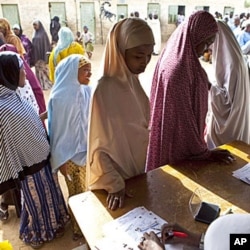This is Giginyu Primary school in Nassarawa Local Government Area, one of many polling centers in Kano State.
The polling units in this center have a long queue. The verification exercise was slow; accreditation did not finish before the voting began. Some card-carrying voters complained that their names were not on the register, so they could not vote. This, despite the efforts of the chairman of the Independent National Electoral Commission, Professor Attahiru Jega, to deal with any problems ahead of polling day.
Independent observer Sadiq Danfollo, who visited polling centers in Kano City, said "in some voting places, there are no voting materials. I believe there must be some [problems] in Jega’s effort to make sure that free and fair election is conducted."
But he said these elections are more transparent than any since the country’s return to civilian rule more than 10 years ago.
Sadiq also said it’s not unusual for voters to have problems with a new electoral system, which included new voting lists and rules that allow the public to see votes being counted.
Sarah John is a political science student at Ahmadu Bello University, Zaria, who lives and votes in Kano. She said the new electoral system has its successes and failures.
"The advantage of the election process going on," she said, "is that so far it is peaceful in my own area. The only disadvantage is that some people who are underaged….. you see them casting votes."
That’s because some were allowed to register, though no official at this time has explained how that was allowed to happen.
She said the Independent National Electoral Commission should do something about the problem.
Zakari Wali is a former chief whip of the Kano State House of Assembly representing the Kano Municipal Council. He said he was impressed with the elections.
"So far, so good," said Wali. "There has never been an election as good as this one. The tempo is very low. Hooliganism dropped almost to one digit. Where I cast my vote there was no problem."
Wali said he is certain the electoral body under the leadership of Attahiru Jega will conduct free, fair and credible polls.
In a press conference in Abuja, INEC head said the commission is working to make sure that the electoral lapses experienced will be corrected.
Kano State elects 21 legislators to the National Assembly. So far the ruling People’s Democratic Party has 11 seats, followed by the All Nigeria Peoples Party with eight and the Congress for Progressive Change with two. In the Senate, the PDP has two seats, followed by the ANPP with one.
Presidential, gubernatorial and state legislative elections are to be held on April 16 and 26.




